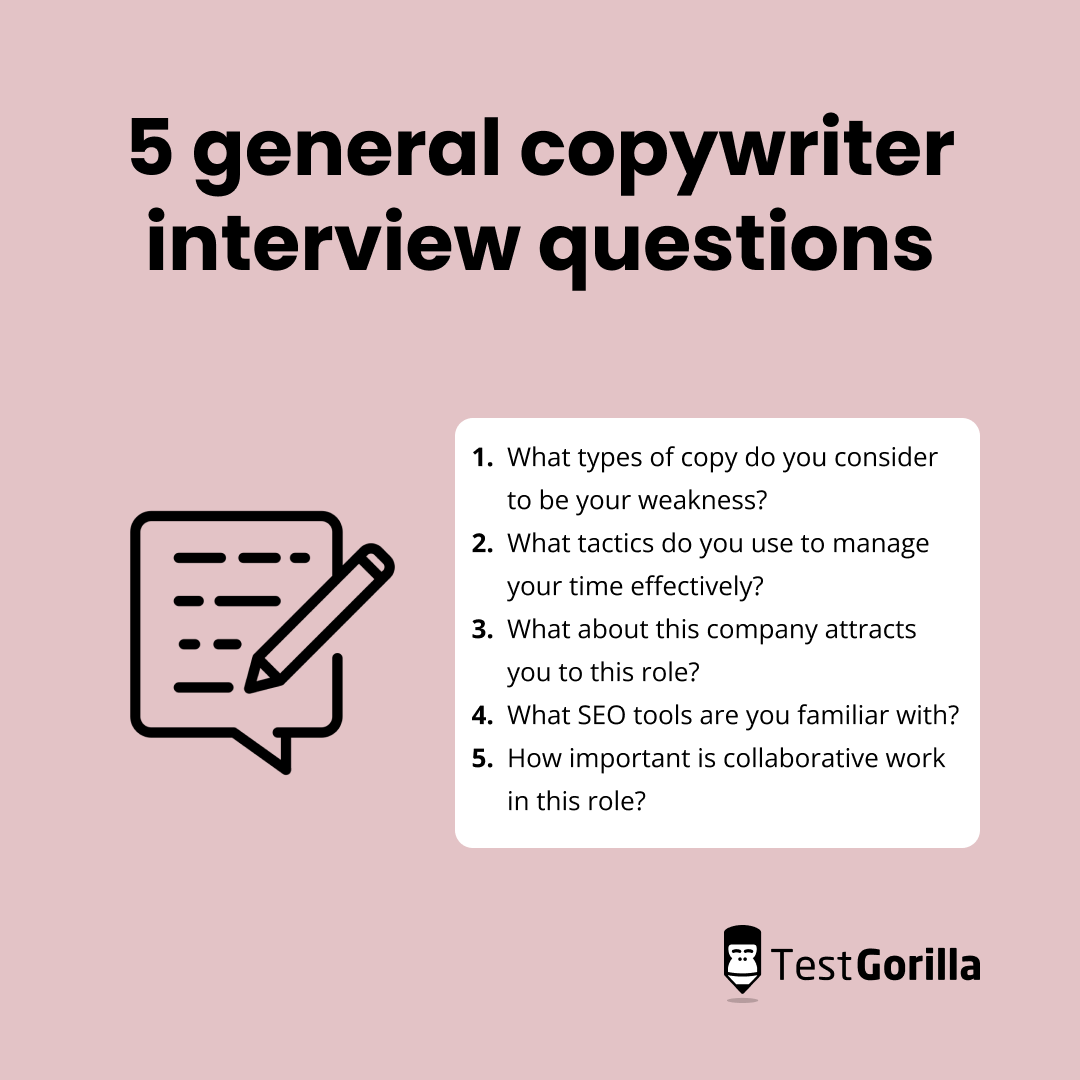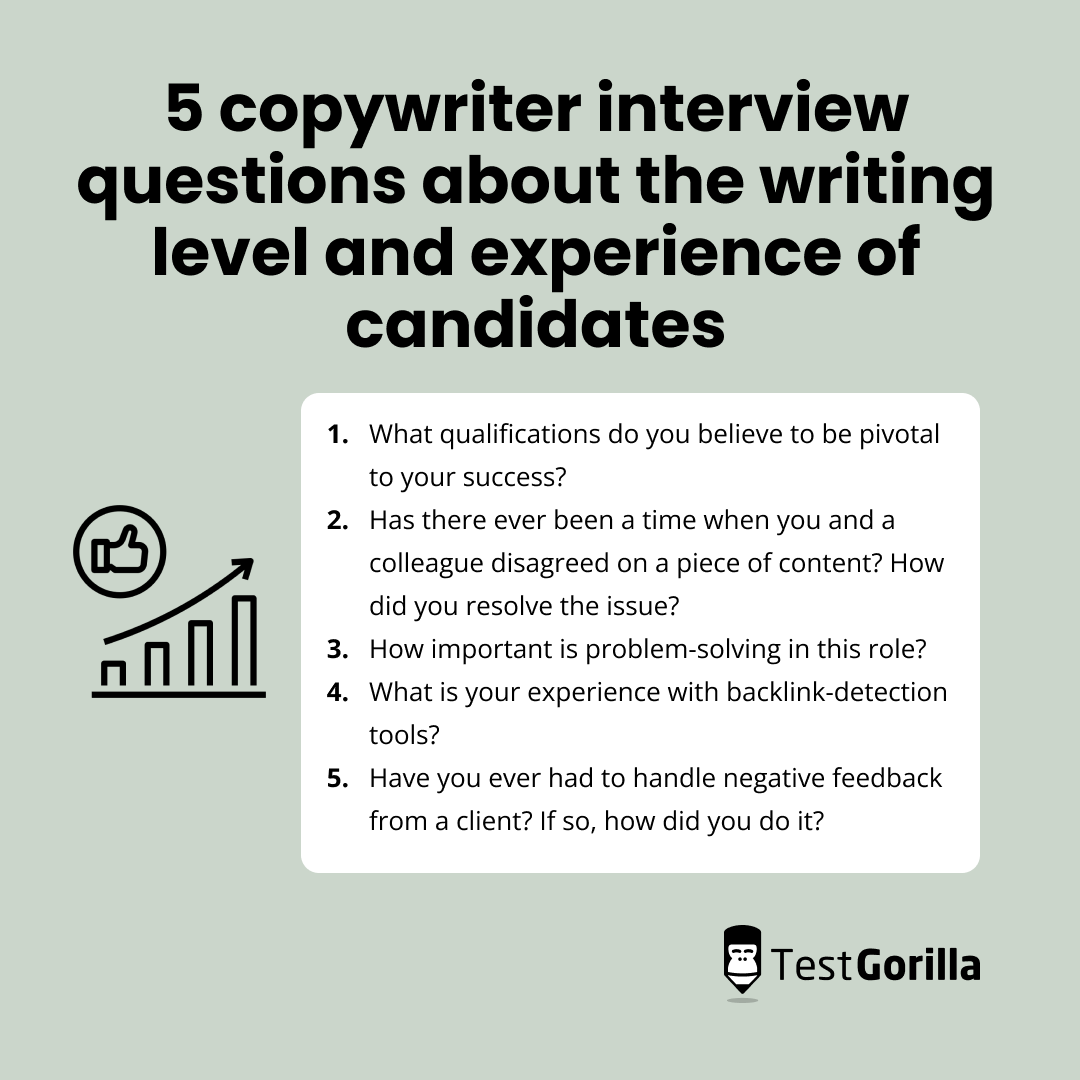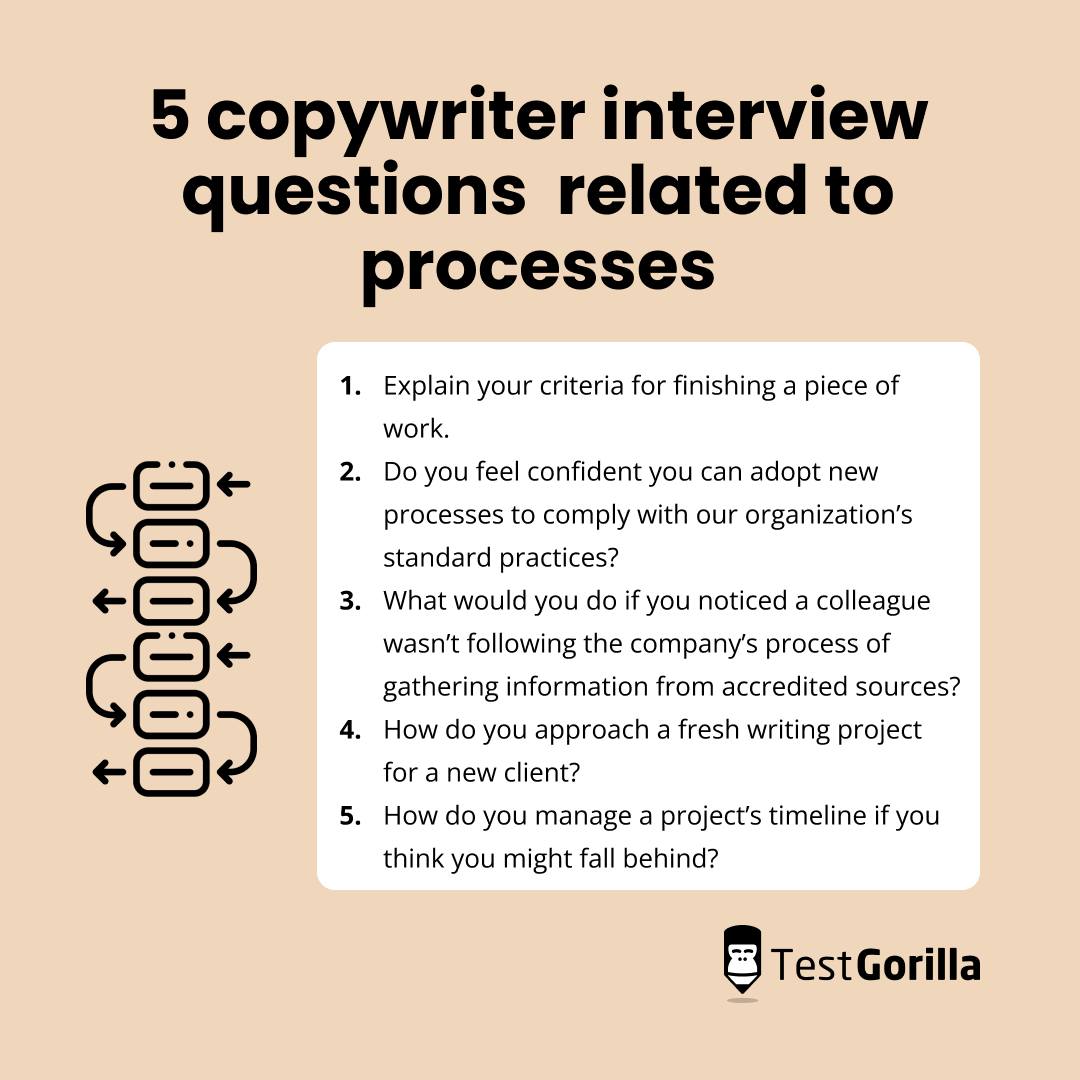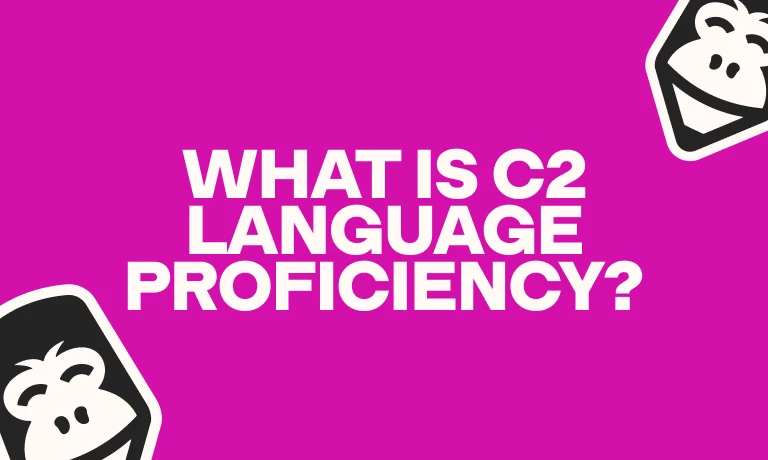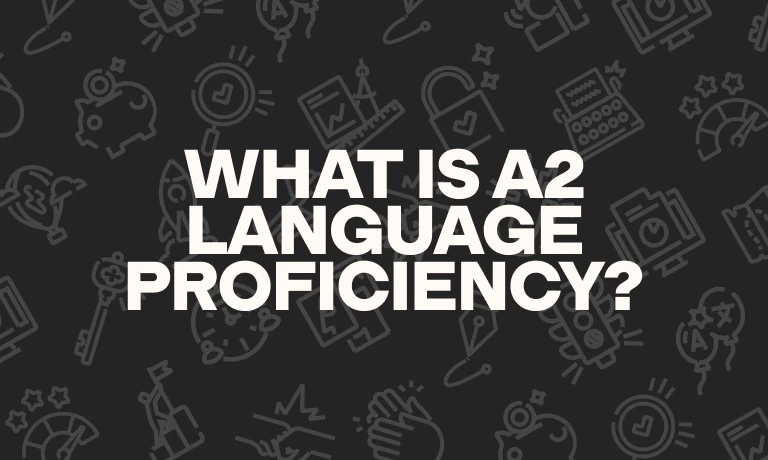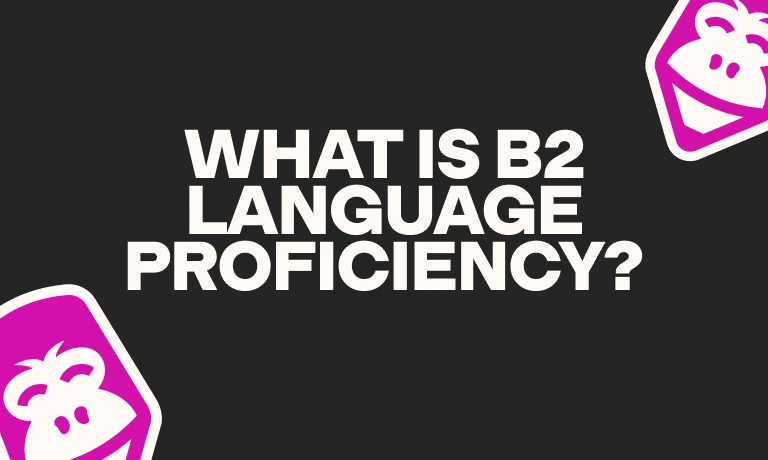50 copywriter interview questions to ask your applicants
Are you preparing to interview candidates for the position of a copywriter?
Don’t worry; finding the right candidate is easy. All you need are the right tools to identify the most skilled writers who can write engaging copy, implement the best SEO practices, increase brand awareness, and market your business.
First, you can assess a candidate’s SEO knowledge with an SEO Copywriting skills test to shortlist your most knowledgeable candidates. Then, you need to use the right copywriter interview questions to gain a deeper understanding of applicants’ writing skills, marketing experience, and other critical skills.
Struggling to create a list of questions to ask during interviews? You’ve come to the right place. Below, you’ll find our selection of 50 interview questions for copywriters, along with sample answers to some of them to help you assess candidates’ responses.
Finding the perfect candidate is easy if you use skills tests and the right selection of interview questions.
Table of contents
- 20 general copywriter interview questions to get to know your candidates
- 5 general copywriter interview questions with sample answers
- 20 copywriter interview questions to assess writing level and experience
- 5 copywriter interview questions with sample answers about the writing level and experience of candidates
- 10 copywriter interview questions related to processes
- 5 copywriter interview questions and sample answers related to processes
- When to use these copywriter interview questions
- Hire the most talented copywriters with our skills tests and copywriter interview questions
20 general copywriter interview questions to get to know your candidates
To get to know your candidates on a deeper level and assess their career ambitions, core values, and primary writing skills, ask them some of these 20 general copywriter interview questions.
When did you first decide you wanted to become a copywriter?
Can you explain what your first client interaction was like?
How important do you think independence is to this role?
How do you measure success in copywriting?
What writing style are you most comfortable with and why?
How do you juggle multiple clients’ stylistic requirements?
What do you consider to be the most difficult aspect of copywriting?
What SEO tools are you familiar with?
Can you name a skill you want to improve in your next role?
What would you consider to be your biggest weakness and how does it impact your writing?
If you were hiring your own writing team, what skills would you look for in the ideal candidate?
How important do you think collaborative work is to this role?
What values guide you when you’re writing?
What is your biggest priority when onboarding a client?
What was the last book you read? Did it teach you anything about writing?
What do you think you bring to an organization that improves its culture?
What types of copy do you consider to be your weakness? For example, social copy, email, website, PR, and so on.
What about our company attracted you to apply to this role?
What tactics do you use to manage your time effectively?
How many words can you write per hour or per day? What strategies do you use to speed up your writing?
5 general copywriter interview questions with sample answers
Here are five general copywriter interview questions with our sample responses and explanations. Refer to them to assess your candidates’ answers and see whether their copywriting knowledge matches your expectations.
1. What types of copy do you consider to be your weakness?
Candidates with advanced skills and progression potential should have the self-awareness to understand the types of copy they struggle with.
This question also enables you to see whether applicants know the different types of copy they’re expected to produce for the role, such as, for example, website copy, copy for ads, social media, newsletters, or PR campaigns.
Applicants should say which type of copy they consider to be their weakest and explain why. For example, they may tell you that they consider social copy to be their weakness because it needs to be very concise and effective.
The best candidates won’t be afraid to speak about their weaknesses and will explain that they’re willing to take tangible steps to challenge this and improve in their next role.
2. What tactics do you use to manage your time effectively?
An ideal candidate should be able to identify the importance of time management and meeting deadlines in a copywriting role. Look for candidates that reference specific techniques, such as the Pomodoro technique or time blocking.
Referring to such strategies shows that candidates are able to put effort and use their critical thinking skills to consistently meet deadlines. They’re more likely to complete work on time, while effectively prioritizing and managing their tasks, compared to applicants who aren’t using any specific time-management strategies.
You can also use our Time Management test to evaluate candidates’ skills.
3. What about this company attracts you to this role?
This interview question allows you to separate the candidates who have done their research about your organization from those that haven’t.
For example, if your website lists curiosity, honesty, and high quality as your company’s core values, then an ideal candidate should explain how these values align with their own. They might also mention how they’ve embodied these values in their previous role.
To assess a candidate’s values against your company’s, consider using TestGorilla’s Culture Add test.
4. What SEO tools are you familiar with?
Experienced copywriters are likely to be familiar with multiple SEO tools they can use to help clients rank higher on search engine results pages (SERPs) and boost conversions. Candidates may explain their previous use of SEO tools and give examples, such as SEMRush, Ahrefs, Moz, and more.
Some candidates may even take this opportunity to explain their keyword-research techniques.
These candidates are the ones to watch because this experience shows that they have an in-depth understanding of the importance of SEO in copywriting. They are willing to use all available tools to create copy that leads to better outcomes for your company.
If you need a candidate who’s also experienced with technical SEO, why not use TestGorilla’s Technical SEO skill test to streamline your hiring process and find the ones who truly have the right knowledge?
5. How important is collaborative work in this role?
Skilled copywriters understand the importance of teamwork. To be efficient, copywriters need to work with others often. For example, copywriters might need to work with:
Marketing managers and SEO professionals to gather keywords and requirements
Managers and clients to collect and implement feedback
Editors to to improve the final copy
Graphic designers to create pages, brochures, and ads
UX/UI designers to enhance the user experience with copy and content
Product managers to create product descriptions
When candidates answer this question, look for answers that explain directly why collaborative work is integral for the role and how it has helped candidates be successful in the past.
This important copywriter interview question will help you determine whether your candidate can integrate effectively into your marketing team.
The best insights on HR and recruitment, delivered to your inbox.
Biweekly updates. No spam. Unsubscribe any time.
20 copywriter interview questions to assess writing level and experience
Depending on your hiring criteria, assessing whether your candidates have the right professional background for the role could be beneficial.
Here are 20 copywriter interview questions that will help you assess applicants’ writing level and experience:
In your previous role, was there ever a piece of copy that was too challenging to write?
What experience do you have in establishing a brand’s tone of voice?
What is the most effective way to optimize web copy for SEO purposes?
What qualifications do you believe to be pivotal to your success as a copywriter?
Have you ever had to handle negative feedback from a client? If so, how did you do it?
What has been your most successful copywriting project to date?
What is your experience with backlink-detection tools?
Have you ever had to adapt your copy to appeal to a younger audience? How did you achieve that?
Have you ever been accused of plagiarizing copy?
What has been the biggest project you’ve ever completed on a very short deadline?
What is the best lesson you’ve ever learned while writing social-media copy?
Do you have any experience writing for a project that led to a significant amount of conversions? How did you do it?
Have you ever created writing briefs for other copywriters or content writers?
Has there ever been a time when you and a colleague disagreed on a piece of content? How did you resolve the issue?
Has a client ever contacted you to complain about consistently unsatisfactory content? If so, how did you handle the situation to maintain a positive client-writer relationship?
Explain how much experience you have tailoring your content to different market segments or niches.
How important is problem-solving in this role?
What is the most interesting industry you’ve ever written for?
What is the best way to translate complex, technical language into an accessible format for all readers?
Do you have any experience proofreading and correcting a colleague’s work?
5 copywriter interview questions with sample answers about the writing level and experience of candidates
Consider using these five interview questions with sample answers so you know how to assess your candidates’ writing level and professional experience.
1. What qualifications do you believe to be pivotal to your success?
This question allows applicants to elaborate on how their academic or professional qualifications have supported their writing skills. Many will likely have role-specific credentials and diplomas, although you shouldn’t automatically disqualify those who don’t.
Typically, copywriters come from diverse academic and professional backgrounds, such as:
Advertising and marketing
Media and communications
Public relations
Journalism
English and creative writing
Psychology, sociology, or humanities
Each one of these fields has the potential to teach copywriters key skills for the role, such as critical thinking, creative writing and storytelling, persuasion, effective communication, research, audience analysis, and more.
Keep in mind, however, that while academic backgrounds may provide a strong foundation, copywriting is ultimately a skill-based profession. Many copywriters develop their expertise through practical experience, self-study, and continuous learning.
When analyzing responses, look out for candidates who are able to explain how their qualifications or experience contribute to their success and enable them to do a better job.
For example, a candidate can reference how their degree in English literature helped them to develop in-depth analysis skills. They might explain how this supports their creativity and attention to textual detail necessary to create high-quality, compelling content.
2. Has there ever been a time when you and a colleague disagreed on a piece of content? How did you resolve the issue?
In a collaborative role like copywriting, candidates need to be able to resolve issues with their colleagues in a constructive, positive way. Candidates can answer this question by referring to the basic skills that allow them to solve conflict, such as:
Active listening
Problem-solving
Relationship-building skills
Empathy and emotional intelligence
Look for candidates who’re able to give an example of an effective resolution of a past conflict and explain why their resolution was successful. This shows a good ability to make decisions under pressure and maintain strong working relationships.
Watch out for candidates who state that resolving issues with colleagues isn’t a priority. This might be an indicator that the candidate has poor collaboration skills.
3. How important is problem-solving in this role?
Problem-solving is essential for producing high-quality web copy and improving existing copy to generate more engagement. Problem-solving helps candidates think critically and understand clients’ pain points, which enables them to create captivating and highly relevant content.
Candidates should be able to give an example from their past experience where problem-solving enabled them to deliver high-quality content or helped them solve a complex issue.
Consider using our Problem-Solving skill test to assess whether candidates can use the right solution-oriented techniques in their work, even when dealing with lots of pressure from clients or managers.
4. What is your experience with backlink-detection tools?
This question enables you to check whether your candidate can use SEO software to analyze the performance of their content.
Look for copywriting candidates who can explain why backlink-detection tools are vital for proper website optimization and how they have used such software to gradually improve the domain authority of a website and boost conversions.
Look for candidates who can list a few backlink-detection and other SEO tools and explain the benefits of using such software to improve writing processes and drive better outcomes for clients.
5. Have you ever had to handle negative feedback from a client? If so, how did you do it?
Client interaction is a core part of any copywriting role, so your candidates must be comfortable receiving feedback, whether positive or negative.
Candidates should explain that managing negative feedback and implementing the recommended changes is a central part of delivering a positive customer experience.
Applicants can then develop on this and give an example of a time when they received negative feedback. Look for candidates who are able to explain how they made tangible changes to their methods and strategies to improve the quality of their copy.
To assess whether your candidates can deliver a positive experience to your company’s clients, consider using TestGorilla’s Customer Service skill test.
This test helps you understand whether a candidate can interact successfully with clients, respond appropriately to feedback, and use a customer-first approach to provide stellar service.
10 copywriter interview questions related to processes
When creating copy for any outlet, copywriters need to follow specific processes to ensure they’re creating high-quality, original, and authoritative content. Every organization and team might have its own processes for:
Audience and keyword research
Competitor research
Using formulas and frameworks to write copy
Proofreading
Performance analysis
Consider using some of these 10 copywriter interview questions related to processes to understand whether your candidates can successfully apply your organization’s methods and systems (and maybe even use their experience to improve them).
What does your research process look like?
How important do you think research is to a copywriter?
Do you use proofreading tools once you’ve finished working on a piece of content?
Explain your criteria for finishing a piece of work.
How do you approach a fresh writing project for a new client?
What is the best process for overcoming writer’s block?
How do you manage a project’s timeline if you think you might fall behind?
What is your process for ensuring there is no plagiarism in your work?
Do you feel confident you can adopt new processes to comply with our organization’s standard practices?
What would you do if you noticed a colleague wasn’t following the company’s process of gathering information from accredited sources?
5 copywriter interview questions and sample answers related to processes
We’ve selected five process-related questions from the previous section and provided sample answers to help you understand whether your candidates can adhere to your and your client’s requirements when working on a project.
1. Explain your criteria for finishing a piece of work.
Candidates must follow a strict process when deciding if work is complete to ensure they deliver content that incorporates all of the client’s instructions and is:
Compelling and easy to read
Grammatically sound
Error-free
Candidates can explain that they follow a process or use a checklist to make sure that their work is complete, such as to:
Make sure they’ve met the client’s requirements (f.e. for keywords, internal and external links, etc.)
Evaluate the copy’s readability
Ensure that the information they’re citing is correct
Thoroughly proofread their copy
Ensure there are no grammatical mistakes
These all require intensive attention to detail, so look for candidates who mention this skill in their answers. You can also use our Attention to Detail skill test to assess this.
2. Do you feel confident you can adopt new processes to comply with our organization’s standard practices?
Candidates should feel confident in changing their current processes to fit their potential new employer’s way of working.
Candidates can express that changing their approach to work can be healthy, because it forces them to look at their copy differently and optimize their work. Look for candidates who embrace change – they may find it easier to integrate into your company culture.
3. What would you do if you noticed a colleague wasn’t following the company’s process of gathering information from accredited sources?
Working in a team to deliver good quality content is essential, so your candidates should be ready to support their colleagues in their work. Ensuring that everyone follows the same processes is important for delivering consistent copy across your organization.
Try to identify whether candidates are empowered to hold their colleagues to account in a positive, constructive way. They may explain that they believe this is a critical part of maintaining a collaborative work environment, which is a good sign of a candidate’s self-awareness and teamwork skills.
4. How do you approach a fresh writing project for a new client?
Your applicant needs to be able to use your processes to approach a fresh project and onboard a client to ensure they deliver a positive customer experience from the outset. Your applicant can explain that they follow a stringent research process to ensure they understand the client fully before starting work.
Look for candidates who explain that their first priority is to get to know the client before they begin writing. These candidates are usually more capable of adapting to clients’ needs and considering all of their instructions and requirements.
5. How do you manage a project’s timeline if you think you might fall behind?
One of the most important project-management processes that copywriters have to follow is managing the project timeline. Meeting clients’ deadlines is central to providing a great customer experience, so look for candidates who know how to manage their time effectively and deliver work on time.
The best candidates may state that in the event of missing a deadline, maintaining an open dialogue with the client is crucial: Keeping them updated and explaining any changes to the project timeline early on is key to maintaining a positive client relationship.
When to use these copywriter interview questions
For the best results, we advise you to always use skills assessments before you interview candidates.
After you’ve shortlisted your best applicants using our Role Specific Skill tests and tested their ability to manage multiple writing projects with tests like our Time Management test, you can move on to the interview stage. There, you can use our list of 50 copywriter interview questions to further evaluate your candidates’ abilities and experience.
Use these questions to evaluate not just whether candidates can write effective copy, but also whether they understand the importance of SEO, know how to manage client relationships, juggle multiple tasks, and follow processes.
By using our interview questions in combination with our recruitment tests, you can gain an in-depth understanding of each of your candidates’ abilities and skills – and find the perfect match for your copywriting role.
Hire the most talented copywriters with our skills tests and copywriter interview questions
Using the right interview questions will enable you to find the perfect applicant for your copywriting role, so it’s important to be selective about the questions you choose to ask in an interview.
With a mixture of personality and culture-based questions, along with specific questions about candidates’ experience and background, you’ll be able to gain a deep understanding of their skills, values, and personality traits. This enables you to make the best decision about whom to hire.
Choose from the 50 copywriter interview questions in this article to make a detailed assessment during your recruitment process.
TestGorilla has a wide variety of cognitive, role-specific, and personality and culture tests you can use to assess your candidate’s suitability for roles like copywriting.
For more information on how skills testing can optimize your recruitment process, register for a free quick demo and see for yourself why 9000+ companies have already chosen TestGorilla.
You've scrolled this far
Why not try TestGorilla for free, and see what happens when you put skills first.


